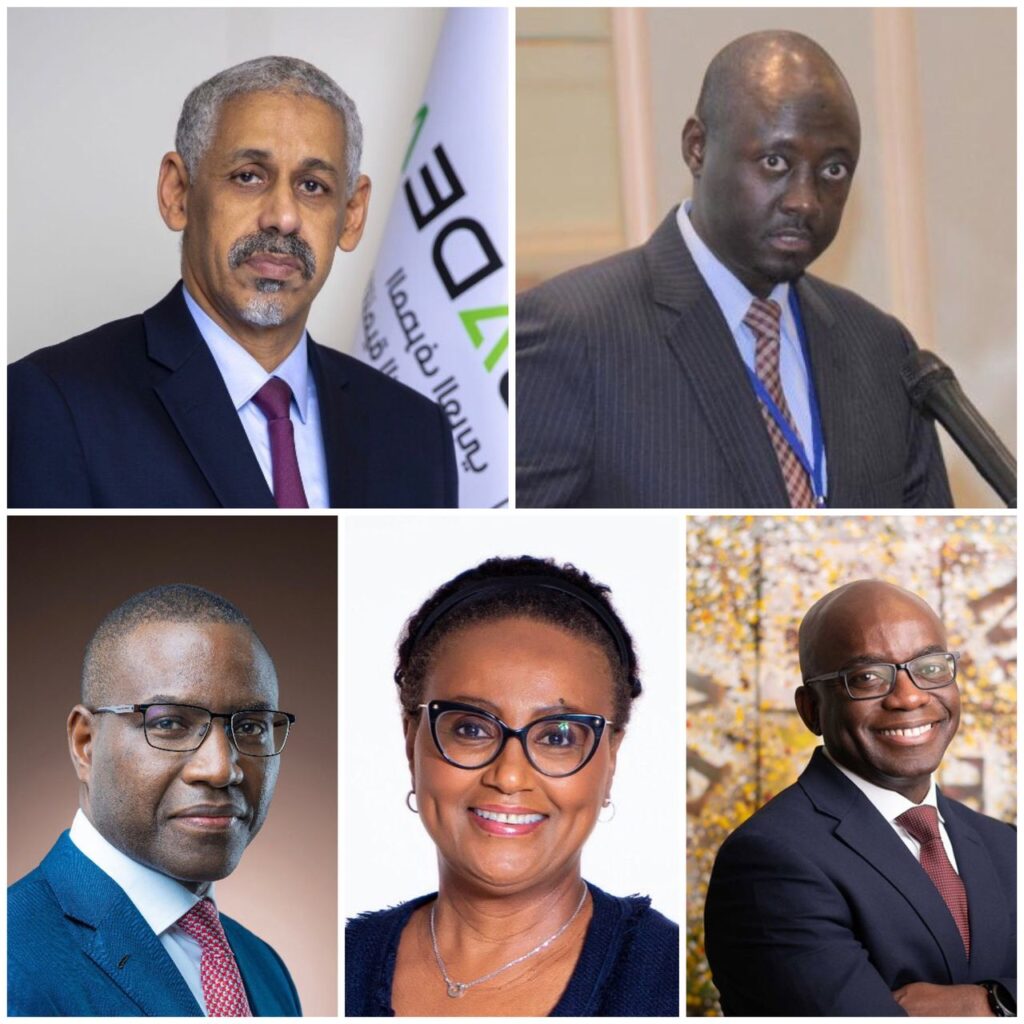
The race for the presidency of the African Development Bank (AfDB) is heating up, with five candidates vying for the top position. As the election approaches in May 2025, the contest is shaping up to be a diplomatic and strategic battle involving lobbying, regional alliances, and power negotiations. The stakes are high, as the AfDB presidency is not just a title—it’s about steering Africa’s financial future and addressing the continent’s pressing challenges, from climate change to infrastructure development and economic transformation.
Among the contenders are South Africa’s Bajabulile Swazi Tshabalala, Senegal’s Amadou Hott, Mauritania’s Sidi Ould Tah, Zambia’s Samuel Munzele Maimbo, and Chad’s Mahamat Abaas Tolli. Each candidate brings unique experience, regional backing, and a vision for the bank’s future. However, one glaring question remains: Why is there no candidate from East Africa?
Bajabulile Swazi Tshabalala (South Africa)
As the AfDB’s Vice President for Finance and Chief Financial Officer, Tshabalala has deep institutional knowledge and a strong track record in managing the bank’s financial operations. South Africa’s economic clout and regional influence could bolster her candidacy.
Her close ties to the current leadership may limit her appeal as a candidate for change. Additionally, her candidacy may face resistance from regions seeking a shift in power dynamics.
Amadou Hott (Senegal)
A former Minister of Economy and Planning, Hott has extensive experience in infrastructure and energy projects. His Francophone background and international connections make him a strong contender.
His lack of direct experience within the AfDB could be a disadvantage, and he may face competition from other Francophone candidates.
Sidi Ould Tah (Mauritania)
As the Governor of Mauritania’s Central Bank, Tah brings expertise in monetary policy and financial stability. His ties to the Arab world could help secure support from non-African shareholders.
His limited visibility in sub-Saharan Africa and perceived lack of focus on development issues may hinder his candidacy.
Samuel Munzele Maimbo (Zambia)
With a strong background at the World Bank, Maimbo is known for his work on financial inclusion and private sector development. His technical expertise and innovative approach are key assets.
His lack of direct AfDB experience and potential challenges in building cross-regional alliances could be obstacles.
Mahamat Abaas Tolli (Chad)
As the Governor of Chad’s Central Bank, Tolli has experience in managing economic challenges in fragile states. His candidacy could appeal to Central African nations.
His limited international exposure and perceived inexperience in large-scale development financing may weaken his position. The Missing Piece: Why No East African Candidate?
While the current candidates represent a diverse range of regions and expertise, the absence of an East African contender raises important questions. East Africa is one of the continent’s most dynamic regions, home to rapidly growing economies such as Kenya, Tanzania, and Ethiopia, as well as emerging players like Rwanda and Uganda. The region has been a hub for innovation, trade, and infrastructure development, making it a critical player in Africa’s economic transformation.
East Africa may be focusing its efforts on other multilateral platforms or prioritizing internal development agendas. Alternatively, the region may lack a consensus candidate who can unite its diverse nations.
East Africa has historically been underrepresented in key leadership positions within the AfDB and other continental institutions. This could reflect broader challenges in regional coordination and diplomacy.
East African nations may be waiting for a more opportune moment to field a candidate, especially given the intense competition and lobbying involved in such elections.
Some East African countries may be grappling with domestic issues, such as political instability or economic constraints, limiting their ability to focus on multilateral leadership roles.
What’s at Stake for East Africa?
The absence of an East African candidate is a missed opportunity for the region to shape the AfDB’s agenda and ensure that its unique challenges and opportunities are prioritized. East Africa’s rapid urbanization, growing youth population, and ambitious infrastructure projects, such as the Lamu Port-South Sudan-Ethiopia Transport (LAPSSET) corridor, require significant financial support and strategic partnerships. Without a strong voice at the helm of the AfDB, the region risks being sidelined in critical decision-making processes.
Conclusion: A Call for Greater Regional Representation
As the race for the AfDB presidency unfolds, the lack of an East African candidate underscores the need for greater regional representation and coordination. East Africa’s economic potential and strategic importance make it a vital player in Africa’s development journey. Moving forward, the region must work to build consensus, nurture leadership talent, and actively engage in continental institutions to ensure its voice is heard.
Will East Africa rise to the occasion and field a strong candidate in future leadership contests, or will it continue to cede ground to other regions? The answer will have far-reaching implications for the continent’s financial future and the AfDB’s ability to deliver on its mandate.
